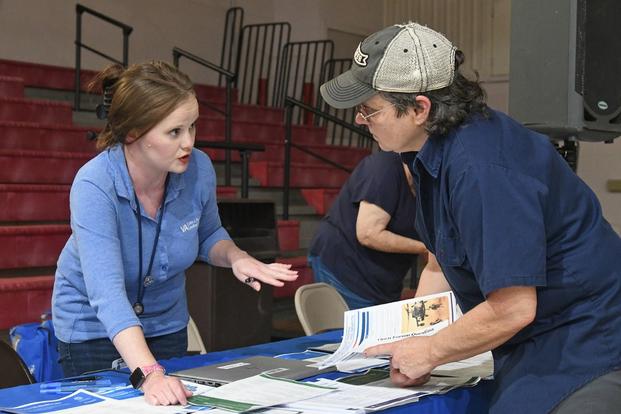The PACT Act gives millions of U.S. military veterans the potential to receive Department of Veterans Affairs health-care and disability compensation, based on their presumed exposure to toxins during their time in the service. The law newly deems more than 300 medical conditions connected to military service if the veteran served in a certain place at a certain time.
Unlike past legislation, the PACT Act's "presumptive" aspect "takes the onus off the veteran" to prove that a toxic exposure took place during military service and led to a given condition, Steve Miska, the PACT Act's transitional executive director, told Military.com.
"That is a game changer in terms of how veterans historically have had to file a claim," Miska said. "Not only did they have to prove that those conditions were manifesting, but they also had to prove the service connection."
According to VA officials, the average time to process a PACT Act claim was aout 148 days, and the department was in the process of hiring 15,000 new claims processors when the act reached its first birthday on Aug. 10, 2023.
Here's what potential beneficiaries can expect during the PACT Act application process:
Filing Form 21-526EZ Starts the Process, and the VA Will (Try to) Gather Evidence
The VA "has a duty to assist," explained Kaitlin Richards, assistant director in the VA's Office of Policy and Oversight. That means that once a veteran files the VA's initial Form 21-526EZ for disability compensation, VA processors will then track down the evidence of past toxic exposure.
"Usually the Social Security number is what connects us to be able to access their records," Richards said. The VA will "pull all of their personnel records to show that they served in one of those territories" covered in the PACT Act, as well as service treatment records that show medical care received while in uniform.
If the veteran received medical care outside the military or VA at a non-government hospital or clinic, VA Form 21-4142 authorizes VA workers to go to those providers and try to track down those records as well.
"It does fall back on the veteran to ultimately provide them to us if we're not able to obtain them, but we do go out on their behalf to collect those records," Richards said.
She recommended that veterans just go ahead and "complete their [Form] 21-526EZ" and let the VA do its records search. If anything's missing, the VA will go back to the veterans to ask if they have it.
You Can Provide Records Up Front, but You Don't Have To
Providing evidence isn't required when filing a claim but can be "helpful right up front," Richards said.
"If they want to send to us their medical records, if they want to send a diagnosis, if they have a copy of their DD-214, we'll take that information up front," she explained. "We send it to our scanning vendors, they scan it, we put it in our system, and we'll have it."
You'll Likely Need a VA Medical Exam
Scheduling a VA medical exam was one part of the process that tended to take the longest, VA officials told Military.com in August.
An exam may not be necessary in certain obvious cases, such as "if we see that they have active cancer, we may be able to evaluate it based off of the records that we have," Richards said. But for the most part, veterans will have to present themselves for an exam before the VA will award disability compensation.
"We need them to report to evaluate what that condition looks like" in order to evaluate it in the context of the VA's disability rating system, Richards said.
More Claims Are Being Approved Than in the Past
Veterans and survivors had filed more than 400,000 PACT Act claims as of August 2023, with an approval rate of 78.6%, Miska said.
"That is much higher, historically, than have been granted. Our historic approval rate for burn-pit exposure claims is about 25%," Miska said. "This just shows you how much more flexibility the law has given us to process claims on behalf of veterans that have been exposed to toxic substances."
If You're Still Not Ready to File, Declaring Your Intent Will Hold Your Effective Date
Because the effective date of your benefits likely will be tied to the date you apply, if for some reason you still feel like you're not ready to file, you can formally notify the VA of your intent to do so, and you'll then have a year to get the actual application together.
"It preserves their date," Richards said, "and it gives them the rest of that time to collect any of that additional evidence."
Plan for the Turnaround to Take Half a Year
After a veteran first files a PACT Act claim, the VA sends out a letter within 5-7 business days acknowledging receipt of the application.
Collecting evidence from an outside physician can take as long as 90 days, Richards said.
While the turnaround time ultimately depends on individual circumstances, the average in August was about 148 days from application to determination.
'No Matter What: File'
The VA's primary message is that veterans "don't have to read through those nuances or find those diagnoses," Richards said. "Honestly, the first thing to tell anybody ... is just to say, 'No matter what: File.' That is what we have been telling everybody. ...
"No matter what, they should file for the claim, and when VA has their paperwork in front of us, we can look at the whole record, we can look at the diagnosis, and we can make that determination and give that decision to them," she added. "Just file so that we can look at all of the specifics and help determine if they are service connected or not."
-- Amanda Miller can be reached at amanda.miller@military.com.
Keep Up with the Ins and Outs of Military Life
For the latest military news and tips on military family benefits and more, subscribe to Military.com and have the information you need delivered directly to your inbox.











